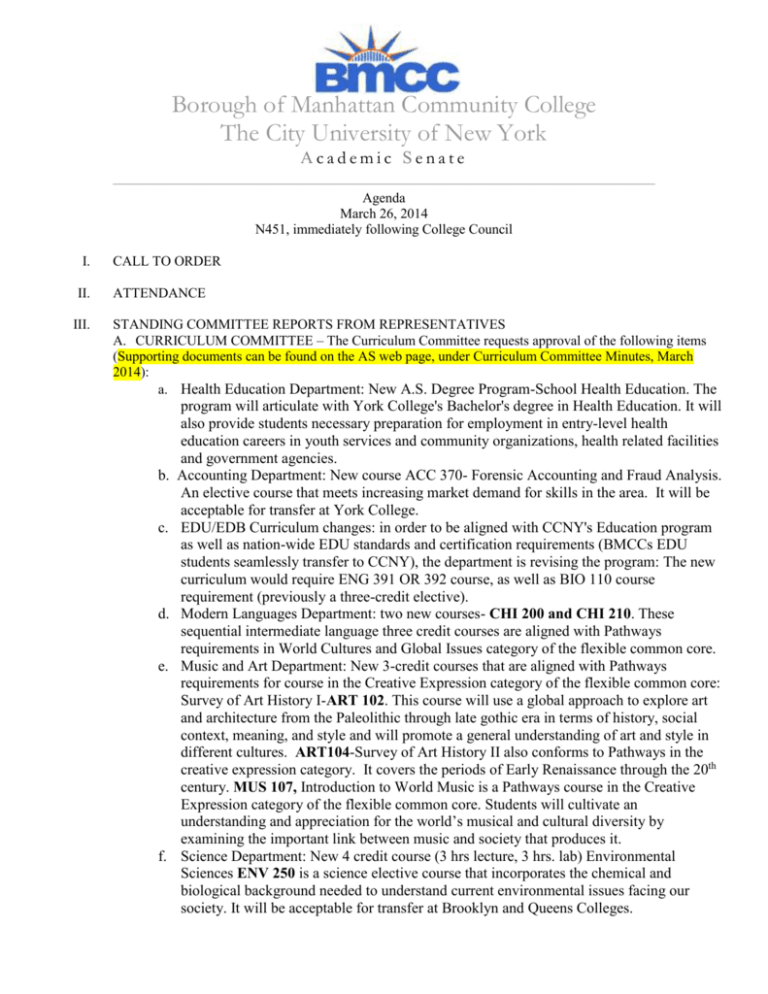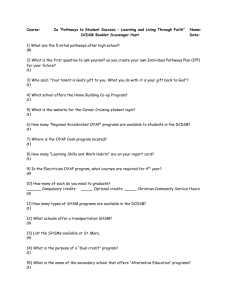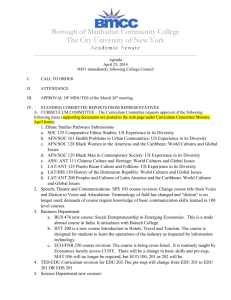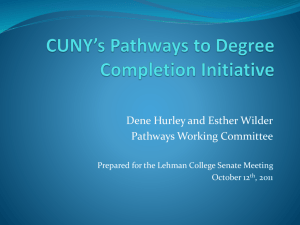ASAgenda3.26.2014 - Borough of Manhattan Community College
advertisement

Borough of Manhattan Community College The City University of New York Academic Senate ________________________________________________________________________ Agenda March 26, 2014 N451, immediately following College Council I. II. III. CALL TO ORDER ATTENDANCE STANDING COMMITTEE REPORTS FROM REPRESENTATIVES A. CURRICULUM COMMITTEE – The Curriculum Committee requests approval of the following items (Supporting documents can be found on the AS web page, under Curriculum Committee Minutes, March 2014): a. Health Education Department: New A.S. Degree Program-School Health Education. The b. c. d. e. f. program will articulate with York College's Bachelor's degree in Health Education. It will also provide students necessary preparation for employment in entry-level health education careers in youth services and community organizations, health related facilities and government agencies. Accounting Department: New course ACC 370- Forensic Accounting and Fraud Analysis. An elective course that meets increasing market demand for skills in the area. It will be acceptable for transfer at York College. EDU/EDB Curriculum changes: in order to be aligned with CCNY's Education program as well as nation-wide EDU standards and certification requirements (BMCCs EDU students seamlessly transfer to CCNY), the department is revising the program: The new curriculum would require ENG 391 OR 392 course, as well as BIO 110 course requirement (previously a three-credit elective). Modern Languages Department: two new courses- CHI 200 and CHI 210. These sequential intermediate language three credit courses are aligned with Pathways requirements in World Cultures and Global Issues category of the flexible common core. Music and Art Department: New 3-credit courses that are aligned with Pathways requirements for course in the Creative Expression category of the flexible common core: Survey of Art History I-ART 102. This course will use a global approach to explore art and architecture from the Paleolithic through late gothic era in terms of history, social context, meaning, and style and will promote a general understanding of art and style in different cultures. ART104-Survey of Art History II also conforms to Pathways in the creative expression category. It covers the periods of Early Renaissance through the 20th century. MUS 107, Introduction to World Music is a Pathways course in the Creative Expression category of the flexible common core. Students will cultivate an understanding and appreciation for the world’s musical and cultural diversity by examining the important link between music and society that produces it. Science Department: New 4 credit course (3 hrs lecture, 3 hrs. lab) Environmental Sciences ENV 250 is a science elective course that incorporates the chemical and biological background needed to understand current environmental issues facing our society. It will be acceptable for transfer at Brooklyn and Queens Colleges. g. Allied Health Department: Health Information Technology Program Revision- HIT Program changes that would allow for more flexibility and would enable students not in HIT Program to take HIT courses with departmental permission. h. Developmental Skills Department: The department is proposing a name change to Language and Academic Literacy Department effective Fall 2014. The name change would reflect more accurately the courses and course content being taught in the Department. B. FACULTY DEVELOPMENT COMMITTEE a. Joe Dr. Update b. Faculty Development Grant update C. INSTRUCTION COMMITTEE a. Course Cap Presentation b. SmartEval Presentation (J. Delgado) (Copies of both presentations can be found on the AS web page, under Instruction Committee 2014 Minutes) D. ACADEMIC STANDING COMMITTEE E. COMMITTEE ON STUDENT AFFAIRS F. ADMISSIONS COMMITTEE G. ACADEMIC FREEDOM a. CUNY Expressive Conduct Policy IV. CHAIR’S REPORT V. NEW BUSINESS – a. Pathways changes - (H.Glaser) (I have reattached Pathways info from last agenda) b. PMP Changes – (K.Conway) (Copy of the presentation can be found on the AS web page under AS Minutes 2014) c. Election results (A. Perdomo) VI. OLD BUSINESS VII. ADJOURNMENT PATHWAYS Evaluation Meeting, February 13, 2014 (Delgado, Glaser, Wong) Plan: IR will identify several years of baseline levels for the indicators below. Indicators will be updated annually in an “interrupted time series” longitudinal design. Indicators: For transferring graduates… o The numbers of students who transfer after graduation, by CC program, entering program, and entering college. o The numbers of credits that are accepted, on average, by CC program, entering program, and entering college. For those who transfer before graduation… o The number who transfer before receiving an associate degree o The number of pathways credits completed by program o The number of remedial credits completed by program o The numbers of credits that are successfully accepted, on average, by CC program, entering program, and entering college Implementation of Pathways courses o Which courses are most often cancelled o Which courses are most often completed o The pass rates for the Pathways courses CONTEXT: Indicators from the Wrigley article: Improving Student Transfer at CUNY o “In Fall 2009, 70.1% of students who transferred from associate programs inside or outside of CUNY did so without associate degrees. Of those transferring from CUNY associate programs, 67.6% transferred without degrees” o Reasons for early transfer: finished remediation, fear that credits won’t transfer, students want the proper preparation for the 4-year major o Number of students with AAS degrees (terminal) who still transfer and must make up general education credits o “In 2009-10, Baruch designated 32.5% of the courses it evaluated to be not transferable, while Queens designated only 9.5% as such.” o “In 2009-10, community colleges designated almost 40% of the CUNY courses they evaluated as non-transferable” from CUNY students trying to transfer in to the CC. There were no matches for the upper division courses taken. o Elective credits vs. “electives within the major” o Accepted credits as a proportion of accumulated credits, graduates vs non-graduate transfers o Delays in having transfer credits evaluated (Baruch requires one or two semesters) o Senior colleges requiring that CC students repeat courses in the major o “Excess credits” beyond those required to graduate







